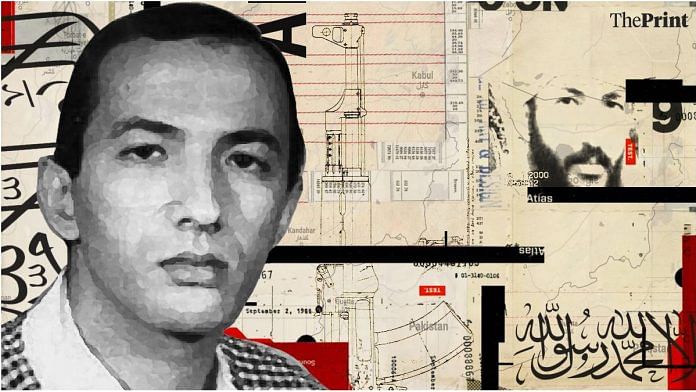New Delhi: “History does not write its lines except with blood,” wrote Abdullah Azzam, the founding patriarch of the jihadist movement that would come to be known as al-Qaeda. “Those who think that they can change reality, or change societies, without blood, sacrifices and invalids,” he went on, “they do not understand the essence of this religion.” “Glory does not build its lofty edifice except with skulls.”
Thirty-five years after he arrived in Afghanistan, his imagination set alight by Azzam’s words, Egyptian-born jihadist Saif al-Adel will take charge as al-Qaeda’s third Emir, succeeding slain chiefs Ayman al-Zawahiri and Osama bin Laden
Al-Qaeda’s new leader comes with a demonstrated talent for terror: In his memoirs, Osama bin Laden’s former bodyguard, Nasser al-Bahri described him as the leader “least affected by the deaths of innocent civilians.”
In 1987, al-Adel caught a flight to Saudi Arabia, telling his family he intended to travel to Mecca on a pilgrimage then look for work, according to former Federal Bureau of Investigation agent Ali Soufan. They never saw him again. The next year, the family was told al-Adel had been killed in a car crash. Later, an Egyptian court declared al-Adel dead.
Earlier this summer, United Nations sanctions monitors revealed the purportedly-dead Egyptian had been designated to succeed al-Zawahiri.
Like other clandestine groups, al-Qaeda maintains a pre-determined and rigid line of command-succession. The line is drawn up by an inner council, the Hittin Committee. Ten top al-Qaeda commanders — including former chief Osama bin Laden’s son, Hamza — have been killed in recent times. Al-Qaeda’s command-chain, however, remained robust, Tore Hamming has noted.
Following al-Adel in the hierarchy are Moroccan-born Muhammed Abaytah, also known as Abdel-Rehman al-Maghrebi, the Algerian national Yusuf al-Anabi, who now commands al-Qaeda’s affiliate in North Africa, and Ahmed Ubaydah, who heads the organisation’s East Africa affiliate, al-Shabaab.
Also read: Killed in US drone attack in Kabul, al Qaeda chief Zawahiri repeatedly waded into India issues
Trainer of terror
Al-Adel surfaced in Afghanistan in 1989, training recruits at al-Qaeda’s al-Faruq training camp. He went on to lead the facility. The jihadist’s students included Ramzi Yousef, who bombed the World Trade Centre in 1993, and Harun Fazul, who led one of the cells involved in bombing United States embassies Nairobi and Dar-es-Salaam five years later, killing hundreds.
The question of whether he left Egypt intending to do so, or was recruited by al-Qaeda in Saudi, remains unresolved.
Al-Adel developed an enduring relationship with the Egyptian jihadist Mustafa Hamid, author of a key insider account of al-Qaeda, co-authored with counter-terrorism analyst Leah Farrall. Later, al-Adel became Hamid’s son-in-law, marrying his teenage daughter, Asma.
In 1992, al-Adel moved to Khartoum, telling fellow al-Qaeda jihadist Muhammad Odeh he hoped to “move the jihad to other parts of the world”. There is speculation he may have trained Somali fighters who brought down two United States helicopters in Mogadishu in 1993, leading to the killing of 18 soldiers. Little hard evidence exists for the claim, though the networks al-Adel built have now grown into the feared al-Shabaab.
Four years later, though, al-Adel and other core al-Qaeda leaders were ejected by Khartoum, because of pressure from the United States. The men were flown to Jalalabad on a private jet and housed in a palace made available by local warlords.
Al-Adel is believed to have resumed training jihadists. He also participated in al-Qaeda’s early efforts at digital communication, and contributed to the design of its first cryptographic system.
Had opposed 9/11
Following the 1998 bombings of the US embassies — in which al-Adel allegedly played a key organisational role — the depth of the Taliban’s patronage of al-Qaeda became clear. In his only known direct conversation with the United States, Taliban chief Mullah Muhammad Omar flatly rejected demands for bin Laden to be arrested.
Instead, declassified documents show, Mullah Omar told state department officials that Congress should compel then president Bill Clinton to resign, and withdraw United States forces from the Middle East.
Certain that the United States would not invade Afghanistan, the Taliban allowed al-Qaeda to continue its terror campaign. Al-Adel struck again in 2000, implementing the bombing of the United States warship Cole.
According to father-in-law Hamid, al-Adel, however, opposed the 9/11 plan. He argued such a large operation would force the United States into war with the Taliban, and thus destroy al-Qaeda’s infrastructure. A majority of the al-Qaeda council, Hamid claims, agreed with this argument — but bin Laden remained adamant.
“In six months,” al-Adel wrote in an angry letter to key Pakistani jihadist Khalid Sheikh Mohammed, “we have lost what took years to build.”
Following the destruction of the Taliban, al-Adel fled to Iran, where he remained in prison for at least two years. From 2007, though, he and other al-Qaeda leaders appear to have been given a certain level of freedom. Al-Adel is thought to have travelled to Pakistan on at least one occasion, and also helped al-Qaeda’s operations in Syria.
The relationship between al-Qaeda and Iran remained fraught, with the jihadist group bombing Tehran’s diplomatic mission in Yemen in 2014.
In 2015, Iran released six al-Qaeda leaders, including al-Adel, in exchange for a kidnapped Iranian diplomat. Their current whereabouts are unknown.
(Edited by Zinnia Ray Chaudhuri)
Also read: Al-Zawahiri invoking culture war in South Asia. Al-Qaeda sees opportunity in Hijab row



